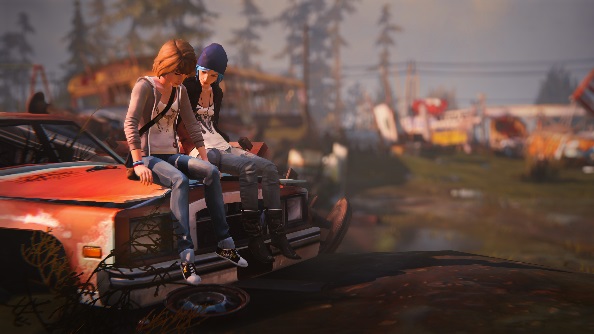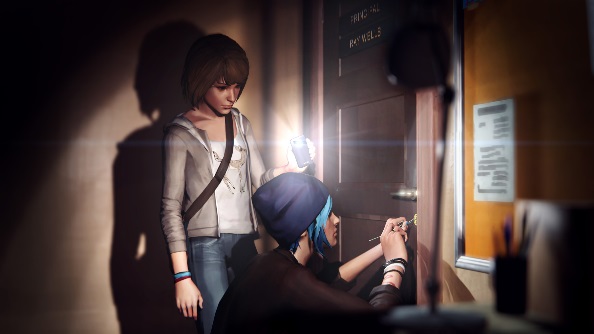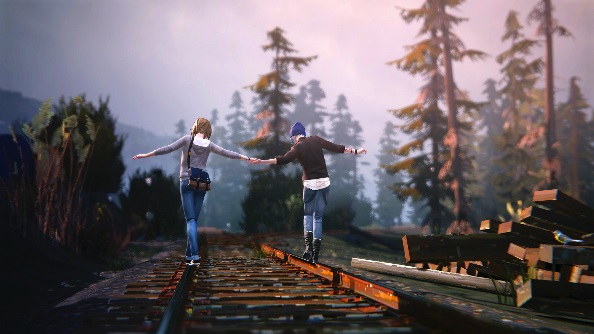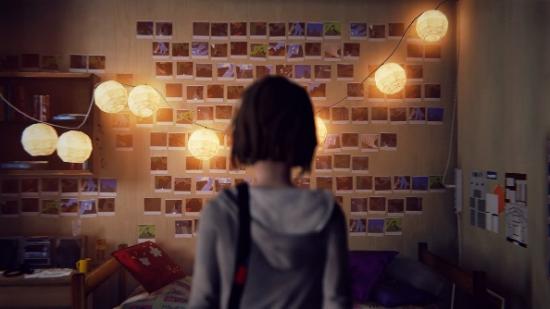Occasionally you play a game that feels like it was designed purely for you. As the first episode of Life is Strange concluded, I realised that it had ticked off pretty much all the boxes of ‘Things Matt Likes’. A strongly-written, slightly awkward female lead? Check. References to geeky pop-culture in every corner? Check. A coming-of-age story exploring relationships, society, and moral character? Check, check, check.
Oh, it’s also a game with time travel and massive decisions. Essentially, developer Dontnod took two of my favourite TV shows – Veronica Mars and Doctor Who – and smashed them together in a mould they borrowed from Telltale Games.

Life is Strange follows Max, a bright-but-withdrawn college student who finds herself at the centre of a crime mystery. As things go from bad to worse, she discovers she has the ability to manipulate time, starting with simply rewinding the last few minutes, and eventually developing into something much more powerful. It’s an ability that’s used to drive forward some puzzles, but for the most part is there to allow you to change your mind on the game’s big moral decisions. Importantly, this isn’t a cop-out move: the repercussions of almost every decision you make can’t be seen until some time after you choose, and so it’s more about judging immediate reactions or observations Max makes. While Telltale’s games force you to choose based on gut instinct because of that ticking timer on dialogue responses, Life is Strange allows you to agonise over every option and spend extended periods imagining the outcome of your vital choice.
While the time manipulation elements are integral to both how the game plays and where the story heads, it’s not actually the compelling element of Life is Strange. The most wonderful thing about Dontnod’s tale is its exploration of humanity and social themes. It perfectly captures what it’s like to be an awkward teenager: a walk down a busy school hallway can be hugely intimidating, a friendly face can be a true hero, a family with good intentions can be your own personal jailor. Among its more detective noir plot elements (drugs, murder, extortion) are heavy hitting issues of suicide, child abuse, and euthanasia. They’re topics explored without flinching, but with a level of care and humanity I don’t think I’ve ever seen in a game that’s not a tiny, ignored indie before.

While its presentation feels exceptionally familiar, Life is Strange is the most progressive game I’ve played in a long time. It’s one of few games that would sail through the Bechdel Test, with its largely female cast made up of of people discussing genuine teenage issues rather than faffing about with the end of the world. (Ok, the end of the world is an issue, sort of, but no-one gives a hoot about that when there’s nerdy Christian kids to bully or a cheating scandal happening in the girls’ dorms). Regardless of your gender, this is a collection of some of the most relatable personalities you’ll ever encounter.
There’s naturally a lot of talking in Life is Strange, and I’ve seen the game pick up some flak for its awkward use of teenage slag. I personally disagree: I’ve got loads of teenagers in my family, and they sound hella awkward when discussing how on fleek things are. I found Life is Strange’s script to deliver that desperation for cool that most teenagers go through, as well as being witty, fun, and having that typical indie film level of insight. It’s also filled to high-heaven with swears, which also rings true of that age range: we all cursed like sailors at high school.

I’ve deliberately kept clear of actual story points here. I hope what I have discussed compels you to pick Life is Strange up, and you should experience it as unspoilt as possible. Like the best TV shows, there’s a great overarching mystery to the whole season, and each new episode explores self-contained problems, be they social, supernatural, or noir. There’s not one that I can single out as ‘weak’, and even as it gets progressively stranger as the finale draws close it still manages to hold firmly onto its core values of friendship.
More than anything else, Life is Strange is an incredible use of the medium to tell a story we don’t really get to see in games. As a big fan of high school dramas and that distinct era of TV that brought us the likes of Buffy and Veronica Mars, I’d love to see more games in this vein. I hope the mass critical acclaim Life is Strange has picked up encourages developers to think differently and begin to explore more areas of life than just physical conflict.
Also: more games with breezy, acoustic indie soundtracks, please.
